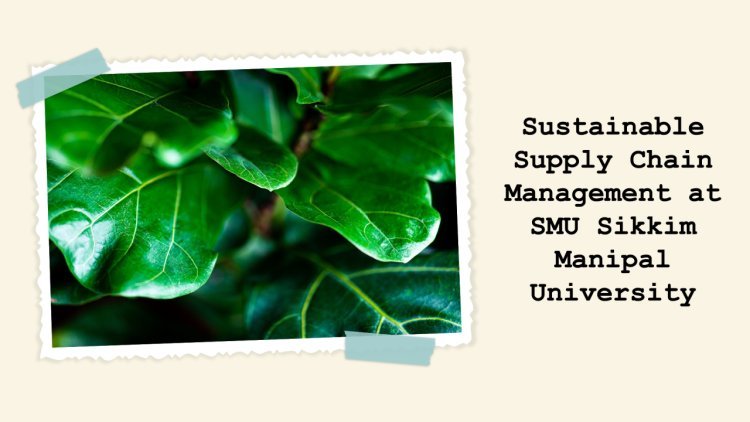Why Sustainability in Supply Chain Management Is Critical
Explore Sustainable Supply Chain Management at SMU Sikkim Manipal University. Learn about innovative strategies and real-world applications for integrating environmental and social responsibilities into traditional supply chain practices.

Hello! Today, we are going to talk about something that is critical for our planet and at the same time is gaining importance among the business fraternity-sustainability when it comes to supply chain management. Maybe you are wondering why it needs to be so crucial. Well, consider this: from morning coffee to the latest smartphone, everything we avail ourselves of comes thr3ough a supply chain. So making these supply chains sustainable means we're wasting less and saving more, as well as doing our bit for the environment. And if you really want to contribute to this field, then the Sikkim Manipal Distance MBA program is an excellent means of acquiring the required knowledge and skills.
The Big Picture
- Environmental Impact: It means companies can implement sustainable practices that dramatically reduce carbon footprints and waste. So this helps in the fight against climate change and preserves our natural resources.
- Economic Efficiency: Through the adoption of sustainable practices, companies save money through resources' more efficient use or reduction of waste.
- Regulatory Compliance: New regulations appear, and companies have to comply to avoid fines and penalties.
- Social Responsibility: A business is no longer just about profit and loss statements. Companies are expected to ensure their labor policies are fair and also contribute positively to society.
Sikkim Manipal Distance MBA: A trendsetter for sustainable practices
Sustainability is not merely a buzzword at Sikkim Manipal University but is woven into its curriculum. An integral part of the learning process in the Sikkim Manipal Distance MBA would equip knowledge of the right practice of sustainable supply chain management.
Courses That Make The Difference:
Sustainable Supply Chain Management
This course goes into the weeds concerning how to make supply chains more sustainable. Some of the topics include:
- The triple bottom line: people, planet, and profit
- Reducing environmental impacts in the supply chain
- Sustainability in sourcing and procurement
- Life Cycle Assessment (LCA)
- Technology's Role in Sustainability
Green Logistics and Transportation
This course focuses on logistics and transportation. The course covered the following areas:
- Sustainable transportation
- Optimizing logistics networks reduces emissions
- How technology can make logistics greener?
- Case studies of green logistics success stories.
Hands-on Learning with Capstone Projects
One of the coolest parts about the Sikkim Manipal Distance MBA is the capstone projects. These are real-world projects where one gets to:
- Supply chain analysis for potential sustainability improvements
- Developing and implementing sustainability strategies
- Measure the environmental impact and business results of these initiatives
Real-World Applications of Sustainable Practices
It's important to highlight that many businesses around the world are already implementing sustainable practices in their supply chains. These real-world applications demonstrate the tangible benefits of sustainability.
Reducing Carbon Footprints
Many companies are actively working to reduce their carbon footprints by optimizing transportation routes, using energy-efficient vehicles, and transitioning to renewable energy sources. These efforts help decrease greenhouse gas emissions and lower operational costs.
Sustainable Sourcing
Businesses are increasingly prioritizing sustainable sourcing by selecting suppliers that adhere to environmental and ethical standards. This ensures that raw materials are produced in a way that minimizes environmental impact and supports fair labor practices.
Wrapping It Up
Sustainability is the future of supply chain management, not just a trend. Sikkim Manipal leads the way yet again through the Sikkim Manipal Distance MBA program in making the leaders of business intelligence and change. Sustainability at the core of the programs' education for supply chain management will go a long way toward leaving behind a cleaner and fairer world for all of us.
So, be it survival in the business world or intention to dive into supply chain management as your career, just think about what you can do with the right knowledge and skills. And who knows that your initiatives will inspire someone someday to pursue sustainable operations?
What's Your Reaction?










![Blog Submission Sites 2024 [High DA]](https://blognow.co.in/uploads/images/202306/image_100x75_6494a03eaff5e.jpg)
![Article Submission Sites 2023 [High DA & PA]](https://blognow.co.in/uploads/images/202307/image_100x75_64c4181f17036.jpg)
![Classified Submission Sites 2023 [High DA & PR]](https://blognow.co.in/uploads/images/202306/image_100x75_649dcd5260808.jpg)




![Article Submission Sites 2023 [High DA & PA]](https://blognow.co.in/uploads/images/202307/image_750x415_64c4181f08ed5.jpg)
![Classified Submission Sites 2023 [High DA & PR]](https://blognow.co.in/uploads/images/202306/image_750x415_649dcd5247eeb.jpg)
![Blog Submission Sites 2024 [High DA]](https://blognow.co.in/uploads/images/202306/image_750x415_6494a03e96bfa.jpg)
